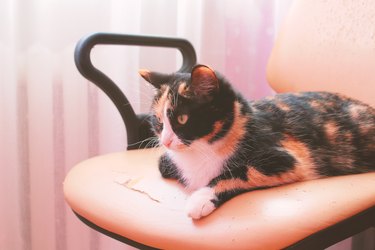Nitenpyram, sold under the brand name Capstar, effectively rids your pet of fleas for the short term — up to 48 hours. It is used to immediately rid a pet of an adult flea infestation but should only be used on animals older than 8 weeks and weighing more than 2 pounds.

Nitenpyram for dogs and cats (Capstar) is not a substitute for a monthly topical or oral flea control product, but it's a generally safe form of temporary relief with few if any side effects. If you give a dog or cat with fleas a Capstar tablet, you'll see fleas falling off and dying approximately a half hour later. If one pet has fleas, make sure every dog or cat in the household receives some sort of flea preventive.
Video of the Day
Video of the Day
How does Capstar work for pets?
Nitenpyram for dogs and cats is similar to nicotine, the active ingredient in tobacco. It kills adult fleas by acting on their central nervous system but has no effect on eggs or larvae. Capstar enters the pet's bloodstream rapidly. As soon as a flea bites the animal after Capstar administration, the flea dies.
Capstar's effect on the parasite's central nervous system causes it to drop off the animal and die. Capstar is safe enough to give to a pet every day or so if necessary to eliminate the flea infestation. It's available over the counter, meaning it does not require a prescription in the United States. Always check with your veterinarian before giving your pet any medication.
Capstar and pet scratching
Itching as a result of using Capstar should be monitored. Be cautious but not too alarmed if your pet starts scratching immediately after you administer Capstar. That's not necessarily serious; it's a common reaction to the fleas as they leave the skin and come to the surface prior to falling off. This is called the "tickle effect." In cats, it can last up to six hours on and off, and in dogs, it lasts about four hours.
However, if itching and scratching persist longer than a few hours, that can be cause for concern. Excessive itching is listed by the makers of Capstar as an adverse side effect or a possible allergic reaction. Extreme Capstar side effects are rare but possible.

Capstar side effects in pets
Capstar side effects are generally mild. Common side effects in cats include meowing and grooming excessively during the Capstar flea free-fall. Others might pant or briefly become hyperactive. However, in rare cases, some cats experience vomiting and diarrhea, appetite loss, drooling, trembling, increased heart rate, and seizures or trembling. These Capstar side effects require veterinary attention.
In dogs, unusual reactions are similar. Rare canine Capstar side effects include lethargy, vomiting and diarrhea, panting, and seizures. Some dogs also experience allergic reactions, including hypersalivation, hives, agitation, and vocalization. Neurological problems, such as seizures or difficulty walking, are more likely in animals who are less than 2 pounds and less than 8 weeks of age. Clearly, the product is not recommended for very young or very small pets.

Capstar risks and contraindications
Unlike many other medications, Capstar isn't contraindicated for use with other drugs, meaning that Capstar can be combined with other flea treatments. However, pregnant or lactating dogs or cats shouldn't receive the drug because it might cause birth defects or abortion.
Kittens or puppies less than 2 pounds in weight or less than 8 weeks of age should not receive Capstar. If your pet shows any sign of an allergic reaction, such as hives or itching after the fleas are gone, call your veterinarian.